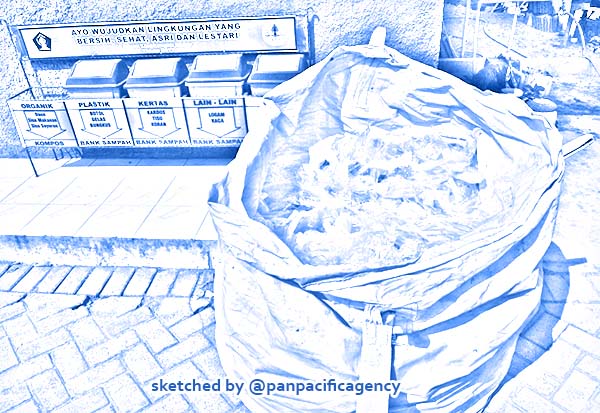For Indonesian enterprises, green is the new black

Used plastic is sorted and cleaned before burning process at a recycling site in Wlingi district, Blitar, East Java. (JP/Aman Rochman). Sketched by the Pan Pacific Agency.
JAKARTA, Nov 26, 2019, The Jakarta Post. Enterprises from micro to multinationals in Indonesia are increasingly pushing a green and sustainability agenda into their businesses as more awareness has been raised among consumer and industry players, The Jakarta Post reported.
Indonesia-based environmental organization Greeneration Foundation founder M. Bijaksana Junerosano said the country could gain a potential US$7 billion from implementing better waste management and an additional $28 billion from implementing a holistic value chain with the circular economy model.
“Indonesia is seeing an increase in the sustainable economy trend, especially because the issue has become a global trend,” The foundation’s executive director, Vanessa Letizia, told The Jakarta Post on Monday.
Various sectors have started their own sustainable economy agenda, which is increasingly visible in recycled product packaging, good agricultural practices, natural dyeing techniques and upcycling in textile, as well as in green investments and financing.
For companies using plastics packaging, with the current global liner economic system, 95 percent of the material value in plastic packaging worth $80 billion to $120 billion is lost annually after their first use, according to a September report by the Ellen MacArthur Foundation.
The circular economy, therefore, “is a matter of business necessity”, Coca Cola Indonesia public affairs and communications director Triyono Prijosoesilo said on Nov. 12.
“In the long run, we have to change the way we produce. We cannot keep extracting from nature and then polluting it with waste.”
Coca-Cola, Nestle and PepsiCo were named the world’s largest plastic polluter this year by Break Free from Plastics, a global coalition of individuals and environmental organizations.
In Indonesia, a country notorious as the world’s second-largest marine polluter, the top three companies that produce the most plastic waste are food producers Indofood, Danone and Mayora Indah, according to Break Free from Plastics audit.
Some of these brands, including Unilever, Nestle, Indofood, Coca-Cola, Danone and Tetra Pak, have turned to efforts in curbing plastic waste through the Packaging and Recycling Alliance for the Indonesia Sustainable Environment (Praise) initiative.
Praise members use 100 percent recycled plastics, and Nestlé has replaced its plastic straws for one of its milk products, Milo, with paper straws.
“Strategic post consumption package handling will open investment opportunities and create jobs in the recycling sector on top of preventing environmental degradation,” said the alliance’s chairwoman, Sinta Kaniawati.
The green movement, which gained traction in the 1960s, has earned a new generation of followers thanks to 16-year-old Greta Thunberg, who has become an environmental activist icon, on top of more research, findings and evidence on climate change.
In the fashion industry, where fast-fashion has become the norm for big players, sustainable small and medium enterprises (SME)have been entering the scene offering premium slow fashion products, such as Bali-based fashion boutique Canaan, which has been using plant-based dye since 2016.
“I would say that our customers are aware of the importance of sustainability. They are also attracted to the craftsmanship and they are willing to pay a premium price,” Canaan’s founder Emmelyn Gunawan told the Post over the phone.
Another sustainable textile producer is Threadapeutic, which upcycles scrap fabrics into fashion and interior items. Founder and designer Nagawati “Hana” Surya said her upcycled products could sell for Rp 1.5 million ($106.72) to Rp 3 million.
Meanwhile, local commodity farms have also been affected by the green economy movement as multinational companies push for sustainable sources.
The Sustainable Trade Initiative Indonesia (IDH) has worked with companies such as French tire manufacturer Michelin and agribusiness company Wilmar to train rubber and palm oil farmers in adopting good agricultural practices.
“We use innovative financing from industries, investment companies and NGOs to boost farmers’ productivity in a sustainable way,” IDH’s chairman Fitrian Ardiansyah told the Post on Oct. 24.
The sustainability trend is also sweeping the stock market, withIndonesia Stock Exchange (IDX) development director Hasan Fawzi saying that foreign pension funds and asset managers are increasingly looking at the environmental, social and governance (ESG) aspects of a company before investing.
Although the bourse already has the SRI-Kehati Index, which comprises environmentally conscious companies with sound and stable finances, Hasan said the IDX was creating ESG indices to cater investors’ appetites.
“We have been getting a lot of requests from global investors as they have higher consciousness on these issues,” he told the press on Oct. 25, adding that the bourse plans to launch the three ESG indices next year.
However, Climate Reality Indonesia project manager Amanda Katili Niode said raising public awareness about the sustainable economy would be the nation’s first challenge, but ultimately, the government must create fitting policies.
“Indonesia is still in the first phase of introducing the circular economy. Many non-state actors have made an effort, but the government’s policy is still the key to mainstreaming the green economy,” she said during a discussion at the Indonesian Circular Economic Forum on Nov. 11.